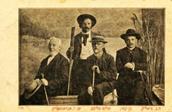Very Brief Review of The Philosophy of Hebrew Scripture, by Yoram Hazony.
Earlier I posted a review of Hazony’s treatment of the political philosophy of the Bible. Here is a very brief overview of the book, based on a review I recently submitted for publication.
Yoram Hazony argues that Western academic tradition misguidedly sees Hebrew Bible as “revelation of secrets” or, following Christian notions of Scripture, as “witness (testamentum),” rather than studying it as ultimately a carefully argued work of “reason”—that is, of Philosophy. For Hazony, Scripture is a complex philosophical system, that, like much Greek philosophy, is in literary form and has religious references. As organized in Jewish tradition, the centerpiece is The History of Israel (Genesis through Kings), presenting basic discussions of ethics, political philosophy, epistemology and metaphysics, with conclusions sometimes more advanced than the Greeks regarding such topics as limited government reflecting the people’s desires and what is eternally true. Parallel collections of Prophetic orations and Writings follow with additional perspectives on these issues. Mosaic Law is has to be discussed (as Hazony notes, he is an orthodox Jew) and it is: Hazony makes it clear that Scripture enjoins observance. But—in contrast to Christian teachings about the necessity of Faith—at the same time Scripture “criticize[s]…perfect trust in God” (24-25), and shows how we must demand what is right and true from leaders and even from God. Hazony argues Hebrew Bible is a complex, multi-authored work of Reason about the purpose of the world and its history, and how Israel should live in the light of that history. Moreover, Scripture asserts that ultimately, the Philosophy it sets forth is necessary to understand the history and task of all mankind.
Hazony has made it clear that he views this as promoting an ongoing discussion about how to view the Bible and its role as a work of Philosophy. Certainly, many departments of Philosophy are dismissive of this literature as having any claim to explain the world as it really is. The work, like Maimonides’ Guide of the Perplexed, may be most accessible to those who are both Orthodox Jews and Philosophers, but will have the impact its author hoped for if Hebrew Bible is understood more widely by academics as a fundamental work of the Philosophical tradition.
Seth Ward

